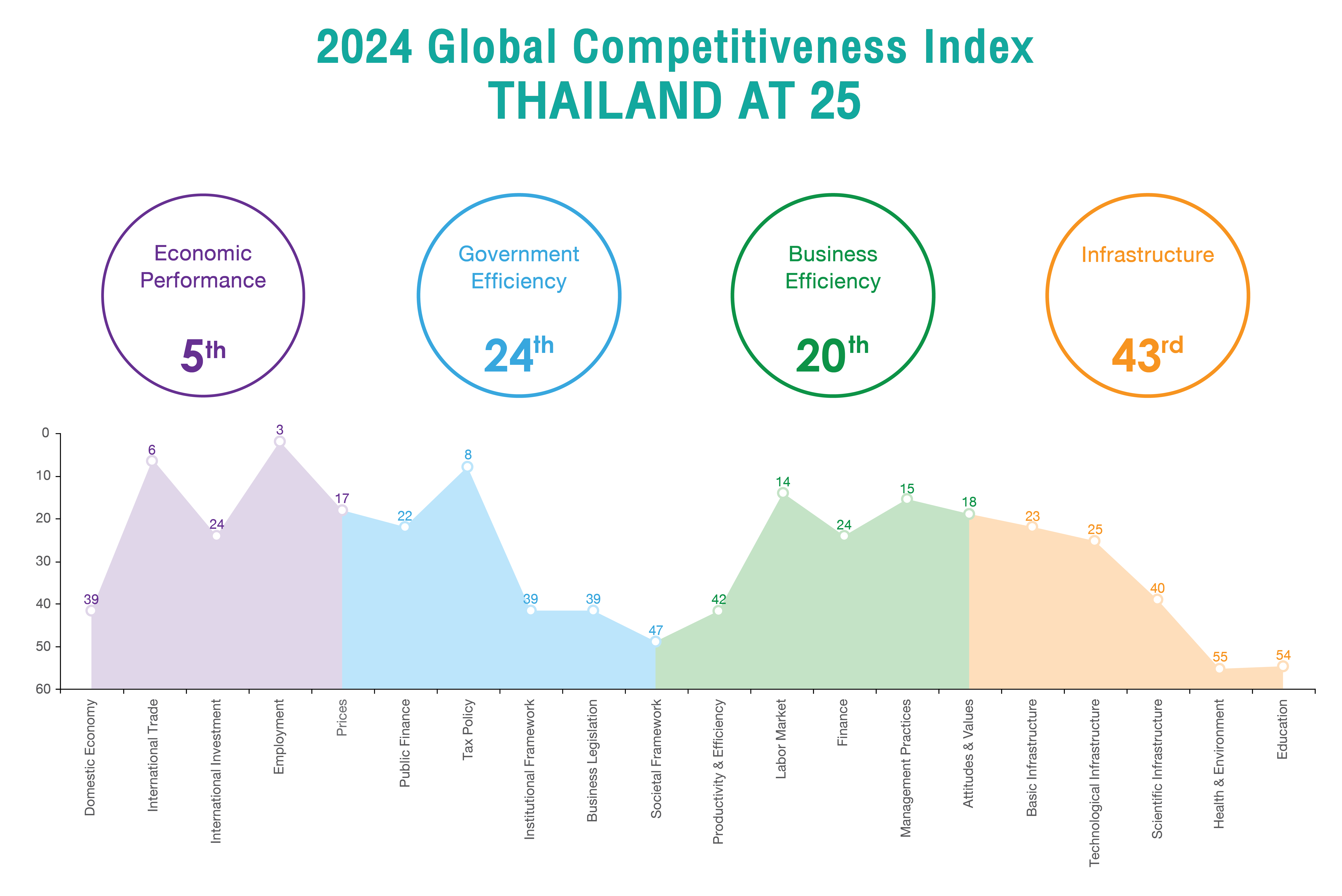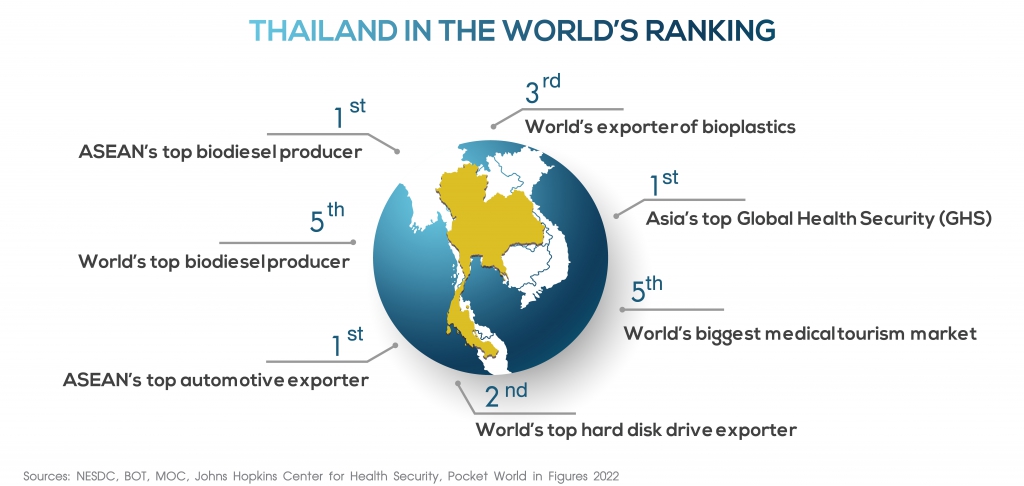Thailand has been and continues to be one of the most successful countries in the region for attracting Foreign Direct Investment (FDI), due to its numerous advantages for foreign investors seeking to do business in Asia. It provides an attractive business climate which has consistently received decades of support for private investment from successive Thai governments, all of which have realized the important role of the private sector in creating and maintaining Thailand's economic growth and prosperity along with its technological development.
In particular, the Thai government's extremely positive stance toward foreign investors means that, unless the special incentives offered by the Board of Investment (BOI) are being applied for, no prior government approval is necessary for making investments in Thailand, and most sectors of the economy are open to foreign investors. Thailand continues to improve its attractiveness for FDI through many government initiatives which seek to make the country more accessible to those seeking to expand their presence in Asia while at the same time reducing the amount of “red tape” required for beginning or expanding such business activities. This has resulted in a steady improvement in the country's overall rankings as published by independent observers, some of which are highlighted here.
When asked to choose the Thailand's top 5 attractiveness indicators for the IMD's World Competitiveness Executive Opinion Survey, Thailand's business friendly environment consistently was given as the first and most important factor. The other factors listed as most favorable included a dynamic economy, open and positive attitudes, a reliable infrastructure, and competitive costs. For 2021, the capital city of Bangkok was rated as the number one destination for a “workation” in a global survey made by the German based vacation search engine company Holidu, where users voted for the location where they would most prefer to go to mix business with pleasure while working remotely from a holiday destination abroad. The Thai capital was ranked first thanks to its affordable cost of living, high degree of English language proficiency, range of attractions, wealth of world class facilities, and numerous multinational corporate offices. Two other Thai cities also made it into the global top ten, Chiang Mai in the north of Thailand, and Phuket in the south.
A few quick facts about Thailand:
With a land area of 513,000 square kilometers, and a population of 66.19 million, Thailand's GDP in 2022 was US$495.2 billion, with a GDP per capita of US$7,089.7, showing a real GDP growth of 2.6%. Consumer price inflation was 6.1%. The unemployment rate was 1.2% with a labor force of 40.14 million (2022 data). The current account balance of the country amounted to a negative 3.4% of its GDP in 2022. According to the UNCTAD's 2022 World Investment Report, the inflow of foreign direct investment (FDI) had reached a total of US$11.42 billion in 2021.
Thailand's position at No. 29 on the 2023 edition of the U.S. News & World Report's Best Countries among 85 participating countries worldwide, with high rankings in Adventure (#5), Movers (#8), Open for Business (#9), and Heritage (#9) categories, showcases its potential as a leading global destination for investment opportunities. With a strong economic growth rate, increasing global influence, and commitment to innovation, Thailand has become an attractive location for investors seeking new opportunities. Additionally, Thailand ranks an impressive 2nd in the Start a Business category and 18th in the Best Countries for a Comfortable Retirement category on the US News & World Report's chart of Best Countries. These impressive rankings serve as evidence of Thailand's business-friendly environment and affordable cost of living, underscoring its status as an ideal destination for both entrepreneurs and retirees.

In the 2024 IMD World Competitiveness Ranking, Thailand secured the 25th position among 67 global economies. Its robust Economic Performance at 5th, efficient Government at 24th, and focus on Business Efficiency at 20th contribute to its competitiveness. Although Infrastructure ranks at 43rd, Thailand's overall performance showcases its potential as a promising destination for business and a high quality of life.

Thailand is the largest automotive exporter among Southeast Asian countries. It is also ranked the second largest Hard Disk Drive (HDD) producer in the world. For biodiesel production, Thailand ranks the 5th of the largest producer in the world and the 1st in ASEAN. Meanwhile, Johns Hopkins University has ranked Thailand as the country with the 5th best health security in the world and the 1st in Asia in the 2021 Global Health Security Index.
Digital Infrastructure Development
Thailand's government is committed to advancing digital infrastructure development as part of its Industry 4.0 economic model. This transformative approach aims to establish Thailand as a "Value-based Innovation Driven Economy" by embracing cutting-edge technologies and digital transformation. Recognizing the significance of Industry 4.0 in driving economic growth and competitiveness, the government is actively promoting initiatives to modernize industries and enhance productivity through automation, robotics, and data analytics.

According to recent research conducted by ETHRWorld, Bangkok, Thailand has been ranked as the second-best place in the world to be a digital nomad in 2023. This recognition highlights Bangkok's appeal as a thriving destination for remote workers and digital entrepreneurs. With its vibrant cityscape, rich cultural heritage, and excellent digital infrastructure, Bangkok offers an ideal environment for those seeking a combination of professional opportunities and a high quality of life. The city's innovative coworking spaces, reliable internet connectivity, and diverse culinary and entertainment options contribute to its reputation as an attractive hub for digital nomads from around the globe. Read more: here.
Medicine and Healthcare
According to CEOWORLD's 2021 survey of 89 countries worldwide, Thailand's healthcare was ranked thirteen best in the world, beating out many renowned European countries like Norway, Germany and Switzerland as well as most other Asian countries except for South Korea, Taiwan, and Japan. The survey evaluates a country's healthcare infrastructure, professional staff competency, cost, medicine availability, and government readiness, resulting in a score of 59.52 on the Health Care Index for Thailand. This high ranking is a testament to Thailand's robust healthcare system, highly skilled healthcare professionals, affordable healthcare costs, and effective government management of healthcare services.
A recent report of research by John Hopkins University also ranked Thailand sixth best among 195 countries providing the strongest health security, as was reported at the Global Health Security Agenda Steering Group Meeting in November of 2019. Thailand was the only developing country ranked among the global top ten, and the first among Asian countries, scoring a total of 73.2 points out of 100. Supporting Thailand's medical profession across the country are 23 accredited institutions providing medical instruction; while there is a reported average of 29.3 health workers per 10,000 population nationwide, according to the World Health Organization. With ASEAN's focus on enhancing intra-regional worker mobility, the size of the medical workforce is expected to further increase as professionals in the medical industry, including nurses, dental practitioners and medical practitioners, mobilize more freely within the ASEAN community. In addition to Thailand’s quality medical schools, the country also emphasizes research, development, and innovation through various governmental institutions, such as BIOTEC, the National Innovation Agency, and the Thailand Science Park. Read the "Thailand - Becoming the Medical Hub of Asia" article.
Thailand – Kitchen of the World

In 2024, Thailand advanced to 15th place in the global rankings for agricultural exports, improving from 16th position the previous year. This upward movement underscores the country’s ongoing efforts to enhance the value and competitiveness of its agricultural sector in the international market.
Thailand continues to play a significant role in global agricultural production:
• Natural Rubber: Thailand remains the world’s largest producer, with an estimated output of 5.28 million metric tons.
• Sugar: The country ranks 4th globally in sugar production, contributing approximately 5% of total world output.
• Rice: Thailand is the 6th-largest rice producer, with production totaling around 30.2 million metric tons.
Thailand also maintains strong positions in agricultural exports across several key commodities:
• Canned Tuna: Ranked as the world’s leading exporter, with export values reaching $2.34 billion in 2024.
• Cassava Starch: Thailand holds the top position globally, with exports valued at $3.13 billion.
• Rice: The country ranks second in global rice exports, generating $6.43 billion in export revenue.
• Sugar: Thailand is the third-largest sugar exporter, with an export value of $2.41 billion.
These figures highlight Thailand’s strategic importance in the global agricultural supply chain and its continued commitment to export-led growth through innovation, diversification, and market expansion.
Source : Ministry of Commerce, Foreign Agricultural Service, Foreign Affairs Office, The Government Public Relations Department, Thailand.go.th, and Trade Policy and Strategy Office
Manufacturing and Economic Statistics
Year on year, Thailand has demonstrated resilience and improvement across several key economic indicators. In 2023, the country ranked approximately 27th globally by GDP size, with a nominal GDP of about $515 billion. Thailand continued to maintain a current account surplus, ranking around 27th worldwide, with a surplus of approximately $7.41 billion. As a major agricultural player, Thailand ranked 11th globally in agricultural output, with an estimated value of $43.3 billion in 2020. Its manufacturing sector remained strong, ranking 22nd globally with a value of approximately $128.3 billion in 2023. The country’s industrial output, including mining and utilities, ranked 21st globally, with a value-added output of around $166 billion in 2020. In the services sector, Thailand held steady, ranking 25th in terms of output, valued at $292.3 billion in 2020. Thailand’s export performance remained robust in 2024, positioning it among the top 26 exporters globally, with exports totaling $299.3 billion. Reflecting ongoing industrial growth, the country saw 2,598 new factory openings in 2023, generating over 106,000 new jobs, according to the Ministry of Industry.
Source: 2024 IMD World Competitiveness Ranking (WCR) The National Economic and Social Development Council, U.S. News & World Report, CEOWORLD Magazine, World Integrated Trade Solution, The National Food Institute, นโยบายการพัฒนาอุตสาหกรรมไทย 4.0 , Thailand 4.0, The best places to be a 'Digital Nomad' in 2023: Research
As of May 15th, 2025
